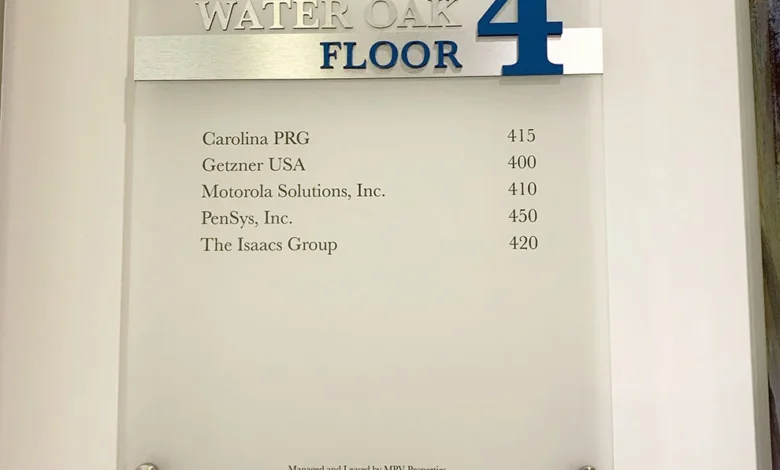The Ultimate Guide to Directional Signs in Charlotte, NC

Directional signs are crucial in navigating complex spaces, and their role cannot be underestimated in enhancing various environments’ functionality and aesthetic appeal. In Charlotte, NC, directional signs are not only about guiding people from one point to another; they also play a significant role in branding and creating a welcoming atmosphere. This comprehensive guide will delve into the types of directional signs commonly used in Charlotte, their applications, and why they are indispensable for offices, buildings, campuses, and other commercial spaces.
Understanding Directional Signs
Directional signs are designed to provide clear and precise instructions, helping people navigate through a space efficiently. Whether it’s an office building, a hotel with a conference center, or a large commercial complex, these signs ensure that visitors and occupants can find their way with minimal confusion. The variety of directional signs available includes acrylic signs, lobby signs, standoff signs, and wall displays, each serving specific purposes while contributing to the space’s overall aesthetic.
Types of Directional Signs
Acrylic Signs
Acrylic Signs are a popular choice for directional signage due to their sleek, modern appearance and durability. Made from high-quality acrylic material, these signs can be customized with various finishes, colors, and textures to match the interior design of any space. In Charlotte, NC, acrylic signs are often used in offices and commercial buildings where a professional and contemporary look is desired. Their versatility allows them to be used for everything from directory boards to room numbers and wayfinding signs. The reflective quality of acrylic signs also adds an element of sophistication and elegance to any environment.
Lobby Signs
Lobby signs are a vital component of the first impression a business makes. They are typically installed in the reception or lobby area of a building and serve as both a directional and branding tool. In Charlotte, NC, lobby signs can be designed to incorporate company logos, office directories, and other relevant information. These signs help visitors quickly orient themselves and find their destination within the building. Lobby signs often use materials such as acrylic, metal, and glass, and can be illuminated or non-illuminated depending on the desired effect.
Standoff Signs
Standoff signs are mounted using standoffs—metal fixtures that hold the sign away from the wall. This design creates a three-dimensional effect, adding depth and visual interest to the signage. Standoff signs are particularly effective in environments where a modern, stylish look is preferred. In Charlotte, NC, they are frequently used in office buildings, conference centers, and hotels to provide clear directional information in an aesthetically pleasing manner. The standoff mounting also allows for easy updating or changing of the sign content, making it a flexible option for spaces that may require periodic updates.
Wall Displays
Wall displays serve as versatile directional signs that can convey a variety of information on a single surface. They can be designed to include maps, directories, and directional arrows, making them ideal for complex environments such as large office buildings, campuses, and convention centers. In Charlotte, NC, wall displays are often used in conjunction with other types of signage to provide comprehensive navigation solutions. They can be customized to fit the specific needs of the space and can incorporate various materials and finishes to enhance their visibility and readability.
Interior Signs
Interior signs encompass a broad range of signage solutions designed to guide people within a building. This category includes directional signs, informational signs, and wayfinding systems. In Charlotte, NC, interior signs are crucial for ensuring that visitors can navigate complex spaces efficiently. They are designed to be clear, concise, and easy to read, with attention given to the placement and visibility of each sign. Interior signs often use materials such as acrylic, metal, and vinyl, and can be customized to match the design and branding of the space.
The Role of Directional Signs in Various Settings
Directional signs play a significant role across different types of commercial and public spaces in Charlotte, NC:
Corporate Offices: In a corporate setting, clear directional signage is essential for guiding employees and visitors through the office layout. This includes signs for meeting rooms, departments, and key facilities.
Hotels with Conference Centers: For hotels with conference centers, effective signage is crucial for directing guests to various event spaces, amenities, and services. This ensures that attendees can easily find their way to different areas, such as meeting rooms, banquet halls, and lounges.
Convention Centers: In large convention centers, directional signs help manage the flow of large numbers of visitors. They guide attendees to different event areas, registration desks, and other important locations, contributing to a smoother event experience.
Campuses and Large Buildings: For educational campuses or expansive commercial buildings, directional signs are critical for helping students, staff, and visitors navigate the complex layout. This includes signs for academic departments, administrative offices, and recreational facilities.
Government Buildings: In city and county government buildings, directional signs assist in guiding the public to various departments and services. They also play a role in ensuring accessibility and compliance with regulatory standards.
Benefits of Investing in Quality Directional Signs
Enhanced Navigation
The primary benefit of directional signs is improved navigation. By providing clear and concise information, these signs help people move through a space efficiently, reducing confusion and frustration.
Professional Appearance
High-quality directional signs contribute to a professional appearance, enhancing the overall image of a building or organization. In Charlotte, NC, businesses and institutions that invest in well-designed signage are perceived as more organized and attentive to detail.
Branding Opportunities
Directional signs offer opportunities for branding and customization. By incorporating logos, colors, and design elements, these signs can reinforce the brand identity of a business or institution while serving a functional purpose.
Flexibility and Adaptability
Directional signs offer flexibility and adaptability, particularly those with standoff mounting or modular designs. They can be easily updated or reconfigured to accommodate changes in the layout or information, making them a practical choice for dynamic environments.
Increased Accessibility
Well-designed directional signs improve accessibility by providing clear information for all users, including those with visual impairments. By using high-contrast text and braille where necessary, these signs ensure that everyone can navigate the space effectively.
Conclusion
Directional signs are an integral part of creating a well-organized and user-friendly environment in Charlotte, NC. From office buildings to hotels, convention centers, and government buildings, these signs play a crucial role in guiding people and enhancing their experience. By investing in high-quality Directional Signs in Charlotte NC, businesses and institutions can improve navigation, reinforce their brand, and create a welcoming atmosphere for visitors and occupants. Whether using acrylic signs, lobby signs, standoff signs, wall displays, or other interior signs, the goal is to provide clear, effective, and aesthetically pleasing solutions for wayfinding and navigation.





